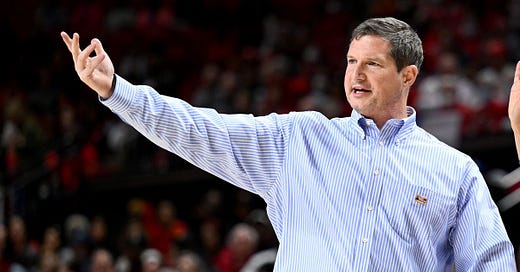Atlanta Dreams big, hires Florida Gulf Coast head coach Karl Smesko
In a surprise move, the Dream looked to the college rank and plucked one of the best women's basketball coaches in NCAA mid-major history.
The Atlanta Dream announced Tuesday morning that they had hired Florida Gulf Coast head coach Karl Smesko. After 22 years in Fort Myers, where he turned the Eagles into one of the most prolific mid-major programs in America, Smesko takes his first WNBA head coaching. It’s his first professional coaching gig in his career.
It’s hard to overstate just how out-of-the-box this hire is. Smesko has no experience coaching at the professional level, spent just one season coaching at the high-major NCAA level (in 1998-1999) and doesn’t have any significant connection to Atlanta or the state of Georgia. But that isn’t to say he isn’t an immensely successful head coach.
Over the course of 17 years, he amassed a 479-91 record at FGCU in Division I basketball. He had spent his first five seasons in Fort Myers leading the Eagles in Division II, where the team went 132-21 in that span. His dominance in the Atlantic Sun conference can’t be ignored over the last decade. Florida Gulf Coast has won the regular season and conference tournament championship 8 of the last 11 years and have lost just two conference games since 2020.
It’s that type of success that has earned him immense respect from his colleagues around the country, with many believing that he’s one of the best tacticians in the college game.
So what makes him so unique?
It’s his unique approach and experimentation that has resulted in his teams being regularly one of the most prolific three point shooting units. If you go on the FGCU roster, every player is listed as ‘shooter’ instead of the traditional guard/forward/center. Over the years, that has paid dividends and you could even argue that the approach of ‘threes and layups’ was his invention long before Daryl Morey brought the practice to the NBA.
It’s for that reason that Smesko’s hire by the Dream is a fascinating one. Last season, Atlanta ranked ninth in the league in three point rate and have never been known as a range shooting outfit. They finished the 2024 campaign with the least efficient offense and the lowest effective-field-goal-percentage in the league. And keep in mind, the Dream had players on the roster this year that have the capability of being good three point shooters.
But when you look at the roster there are a lot of dynamic athletes and playmakers that aren’t the best at creating offense for themselves just yet. Smesko has the chance to work with a Haley Jones or Laeticia Amihere and unlock their potential. Rhyne Howard is a bonafide all-star with some ceiling still to reach as well as a three point jumper that could use some work. This hire feels like a move for her.
At the end of the day, I think it’s a high-risk, high-reward hire but the floor of Smesko’s potential is raised because of how modern his philosophy is. His teams get out and run, they cut and move off-ball, they thrive on causing havoc plays and forcing turnovers. That feels like it absolutely has a chance to work when you have a roster that already has a higher floor than its’ results showed last year.
The only thing that may need to be looked at is the timing of it. I doubt Smesko wanted it to play out this way but the crossover of WNBA/NCAA seasons mean a program is out their head coach just two games into the year. The game is the game, to be sure, and I doubt the WNBA really cares about the collateral damage of a mid-major program in the college ranks. But if the practice of taking swings on college coaches becomes more commonplace in the future, there has to be a way to ease the strain of potentially derailing entire seasons for programs that stand to lose their leader.





"The game is the game, to be sure, and I doubt the WNBA really cares about the collateral damage of a mid-major program in the college ranks. But if the practice of taking swings on college coaches becomes more commonplace in the future, there has to be a way to ease the strain of potentially derailing entire seasons for programs that stand to lose their leader."
Where does this "way to ease the strain" come from? The W? The NCAA? Contractual language (which isn't a global solution and doesn't necessarily prevent this)?
Even with the the transfer option available after a coaching change, that's a tight fit between the end of the W season and before the NCAAW season gets underway. Seems like an unfortunate, unavoidable flaw in the system because of the calendar.